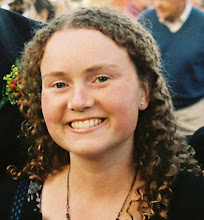For I have time for nothing /
But the endeavor to balance myself /
Upon a broken world.
--Amy Lowell, "September, 1918"
I feel as if the weight of the world were crashing down on me tonight.
I just finished watching a movie called "Pray the Devil Back to Hell"-- a documentary about the way women in Liberia helped to end their 14-year civil war. It's an inspirational film about women who decided that someone had to end the war, and, since no one else was going to, they would. It is a decidedly hopeful film, one where a seemingly unsolvable situation is resolved.
This is accurate. Those women helped to bring peace, and Liberia has made incredible strides since the war ended just six years ago. But as I watched the film, I found myself again and again bombarded with facts that I already knew, yet preferred to forget. Up to 10% of Liberian children were used as child soldiers. Women and children were senselessly raped and maimed. Thousands were killed. Thousands more were displaced.
Since the war ended, Liberia has begun to recover. Infrastructure is slowly being rebuilt, and democracy is taking hold. Despite this, the Liberian people remain desperately poor; their condition has improved, but it is still far below what most of us would consider livable.
Difficult though this situation is, to me, that is not the worst of it. It seems to me that physical hardship is nothing compared to the psychological and spiritual damage that has been done. How can a child begin to recover from seeing her parents killed? How can a child recover from being forced to kill his own parents? How can a mother forgive those who raped her child?
If this were just the case in one country, I might be able to push it to the back of my mind, to act as if it were an isolated incident, one that is heartbreaking, but, ultimately, an event that has no effect on me. But more and more I see this as simply indicative of the human condition. Guatemala, the Congo, Sudan, Bosnia, Iraq, Afghanistan-- this is just a smattering of the places that have seen unimaginable evil during my lifetime.
I wish that I could say that those who have committed such atrocities are unlike the rest of us. But I don't believe they are. I believe that I, in the right circumstances, could be just like them.
I bought a book this weekend called Good News about Injustice. It is by Gary Haugen, the president of the International Justice Mission. I've only just started reading it, so I can't tell you much about it, but I believe the gist of it is that the good news about injustice is that it is temporary-- that God is just and will bring justice, and that he uses us to do it. I believe that this is true.
I also believe, though, that God's justice is not the best news. In places like Liberia, where many of those responsible for atrocities are victims of even worse atrocities, where does justice even begin? If there is only justice, where is hope?
I believe that better news is that God is merciful.
Yesterday was Easter, and a few days before was Good Friday. Good Friday commemorates the worst of crimes against humanity-- and against Deity. The name seems bitterly ironic, at first, for a day on which Evil put Good to death. But I believe the day deserves its name. On this day, Good defeated Evil by bearing all of the pain and sin of the world. "The punishment that brought us peace was upon him, and by his wounds we are healed" (Isaiah 53:5).
It is because of this that I have hope.

No comments:
Post a Comment